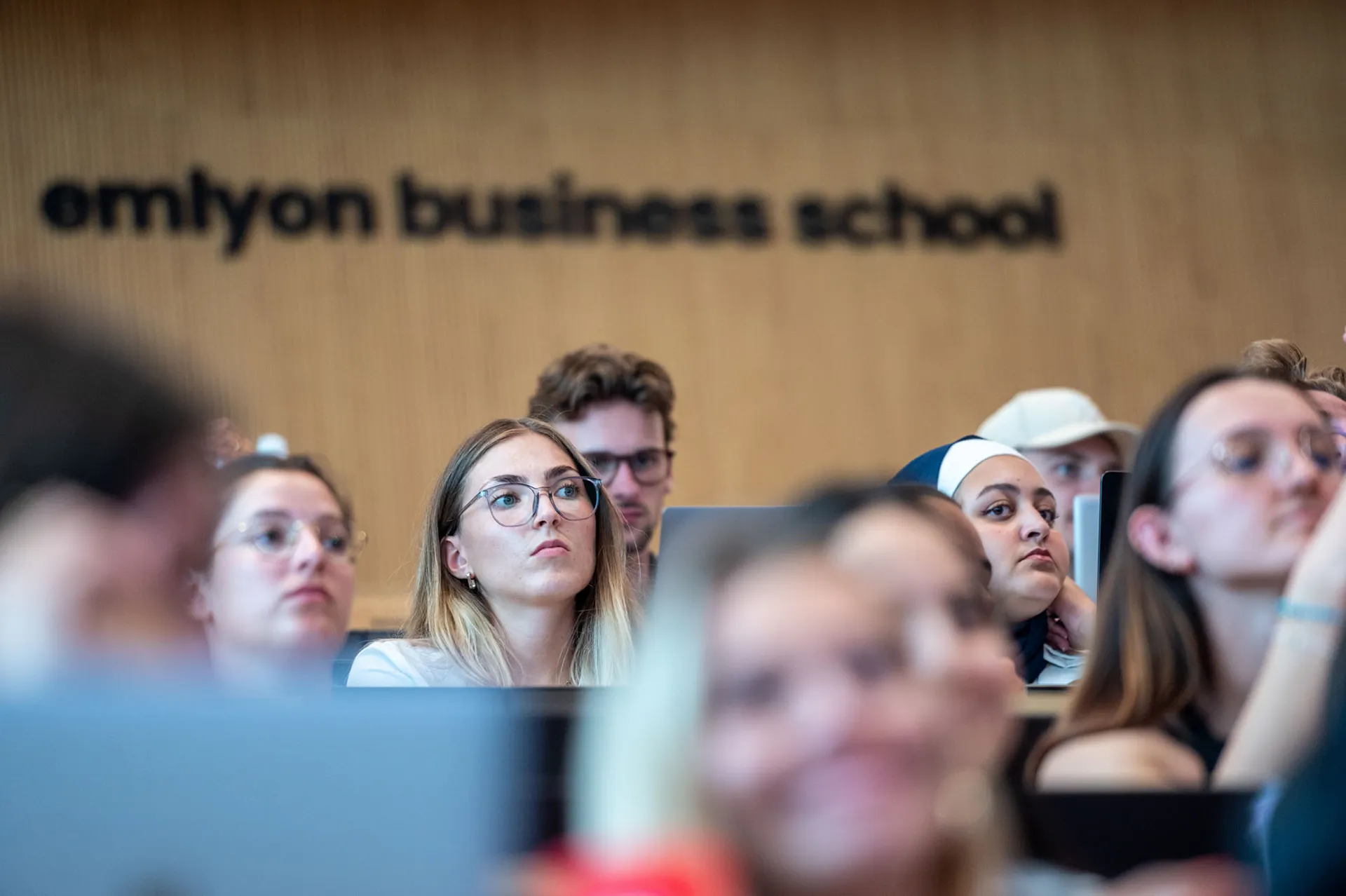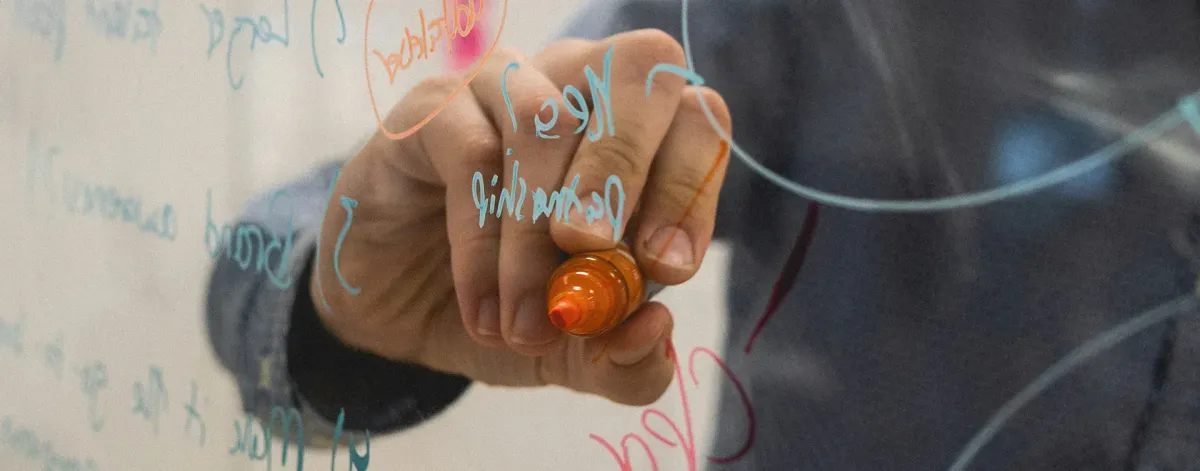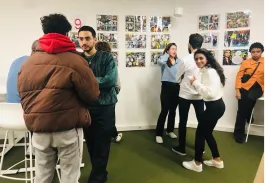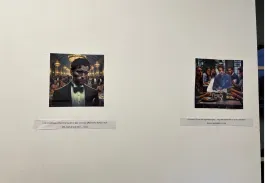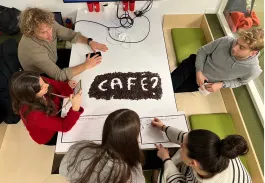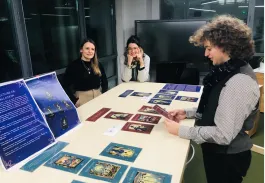Ethnography Institute - Events
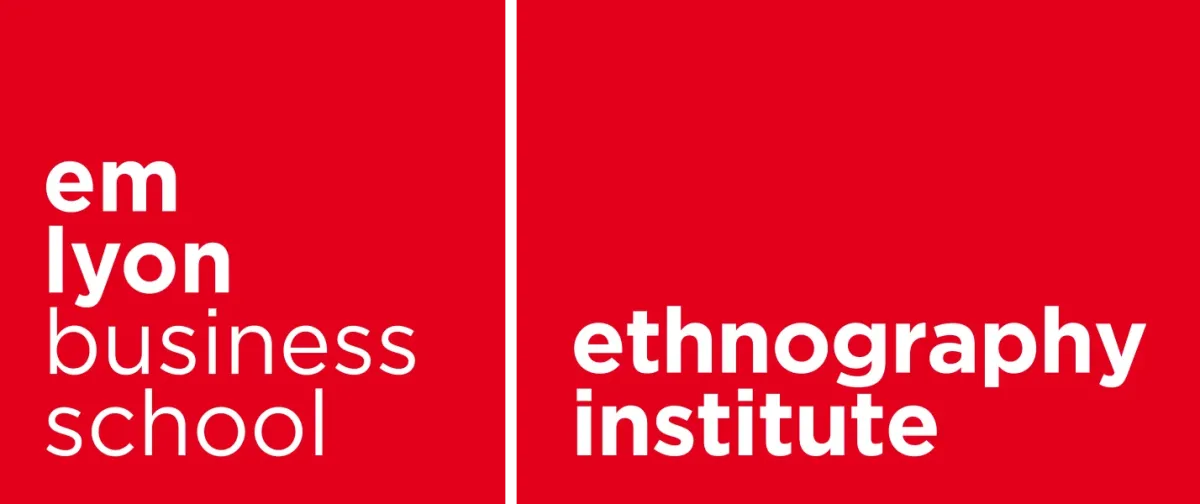
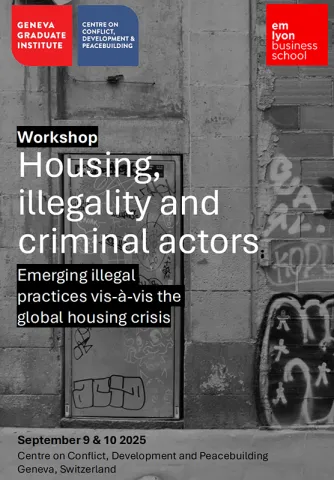
Housing, illegality and criminal actors
Emerging illegal practices vis a vis the global housing crisis
September 09 -10 2025
Centre on Conflict, Development and Peacebuilding Geneva, Switzerland
Organizing Committee
Elena Butti, Geneva Graduate Institute Switzerland
Guillaume Dumont, emlyon business school, France
Housing has become a critical global challenge. While an increasing proportion of the world’s population struggles to find affordable homes, others endeavour to maintain control over existing housing. This crisis is exacerbated by rapid urbanisation and migration, placing pressure on cities to accommodate growing numbers of socioeconomically disadvantaged residents. The issue extends beyond urban suburbs, as processes such as touristification and gentrification in wealthier neighbourhoods inflate housing and rental prices throughout entire cities.
Informal housing has long been a reality in the Global South, where marginalised populations have traditionally sought shelter in urban slums due to weak state institutions and unregulated housing markets. (Malik et al., 2020; Meth, 2017).
While these informal settlements have historically emerged as a result of community-led efforts, they are now increasingly becoming targets for market speculation due to rising “rentisation” (e.g., Ávila Martínez, 2022; Stang Alva et al., 2022), with criminal groups starting to exploit the housing needs of vulnerable populations (e.g., Araujo 2019; Muller 2021).
In the Global North, it has been assumed that banking systems would enable individuals to purchase a house and that governments would offer social housing. Informality primarily manifested in illegitimate occupation as a political endeavour. (Martinez, 2019). Today’s reality is more complex, as housing has become a prime investment vehicle (Card, 2024; Gil & Palomera, 2024), reshaping the infrastructure of the housing market and, to some extent, its imbrication in illegality or criminality. Examples of this trend include emerging forms of commercialisation surrounding housing, such as eviction groups. (Pozzi & Rimoldi, 2017) and underground housing markets where occupied apartments are illegally sold to criminal organisations (Dumont & Clua-García, 2025).
This Paper Development Workshop (PDW) aims to open new vistas on the housing, illegality, and criminality nexus underpinning part of the global housing crisis. We invite papers using an ethnographic or qualitative approach to tackle questions such as:
- What socio-spatial and political conditions contribute to the emergence and evolution of illegal housing practices and strategies?
- What emerging illegal practices and strategies facilitate individuals’ access to housing?
- How do these practices and strategies interact with existing laws and housing policies?
- How are illicit housing markets structured, who are the principal actors involved, and what norms and conventions govern their operations?
In what capacities are vulnerable populations engaged in these markets, both as victims and as active agents?
This PDW aims to guide researchers across disciplines (e.g., sociology, anthropology, criminology, geography, urban studies, organisational studies) in developing their work. Each author will be allocated 10 minutes for their presentation and 35 minutes for discussion. Two invited discussants will evaluate each paper and offer constructive feedback to create a compelling narrative and enhance a theoretical contribution based on this data. All authors must also commit to reading two selected papers prior to the workshop to provide additional written feedback.
Abstract submission
Please send an abstract of 500 words and a short biographical note to gdumont@em-lyon.com and elena.butti@graduateinstitute.ch by March 31st, 2025. Notification of acceptance will be sent by May 1st, 2025. Draft papers must be submitted by August 1st, 2025.
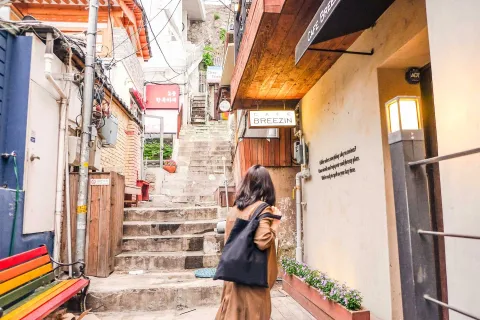
Call for papers: “Ethnowow”
The production of ethnographic theory
May 12 & 13 2025
Institut Ethnographique, emlyon business school
Lyon, France
Connecting theory with observation lies at the heart of ethnography, yet producing ethnographic theory is one of the most challenging tasks ethnographers face. While it is widely recognised that ethnography allows to unearth relationships not adequately covered by existing theory and has a unique discovery potential, whether theory should be used inductively, abductively, or deductively has always been contentious (Tavory & Timmermans, 2009; Wilson & Chaddha, 2009).
Producing ethnographic theory requires maintaining critical distance to analyse people’s views rather than merely reporting them, moving from descriptively useful folk concepts reflecting how people make sense of the world to theoretical elaborations (Khan, 2017; Wacquant, 2002). Nevertheless, it also requires avoiding using field observations to fit preconceived notions and purposively fulfilling predetermined theoretical goals (Boellstroff et al., 2012), which is increasingly difficult given the emphasis on theory in most management and organisation journals.
These and other challenges complicate how ethnographers connect their empirical material with existing knowledge to make sense of their data and develop new theoretical arguments. These challenges often lead to two unproductive extremes. On the one hand, highly descriptive accounts that lack analytical depth, often bolstered by calls to show more (and more) data alongside using visual artefacts such as tables to convince in a decontextualised manner instead of explaining what is at stake in the findings. On the other hand, over-theorised accounts lack the necessary ethnographic substance because the minute observations that should be offered as palpable evidence are too parsimonious and unconditionally subordinated to theory. These extremes often result in criticism that ethnographic accounts are either too descriptive or superficial, indicating a struggle with the observation theory nexus.
This two-day workshop is designed to help early-stage scholars overcome some of these challenges, specifically to connect empirical material and existing knowledge to produce ethnographic theory addressing questions about organisational and managerial questions in contexts not limited to the ‘traditional organisation.’ To help them unleash the explanatory potential of their data, we will start with and work through empirical materials. Instead of requesting conventional research papers, we would like to ask participants to share a research note, namely field descriptions of surprising/interesting events structured around a theme instead of a theoretical gap to be filled in the first place.
We view this event as a friendly and collaborative space to share the peripeties of the ethnographic journey and think both through and beyond individual observations and theory with an interdisciplinary group of supportive people (e.g., Management, Sociology, Anthropology, Entrepreneurship). Experienced scholars will chair each panel and participants will have their research notes discussed by two reviewers. The time allocated to individual presentations will be limited to allow maximum discussion of the research notes among the participants. In addition to the panel discussions, the second day of the workshop will have a session devoted to discussing the supervision of PhD students engaged in ethnographic fieldwork. This session will also address the available training for ethnographic research within and beyond a business school environment. This session will begin as a round table among supervisors to share their perspectives, experiences, and learning about this process before transitioning into an open conversation with PhD students.
The Ethnographic Institute at emlyon business school will host the workshop. Participation is free of charge, and refreshments and meals for the two days will be provided, but participants are expected to cover their travel and accommodation expenses. Several grants are available to support participants with limited funding.
To participate, we expect a short research note of 1000/1500 words by January 15, which should be sent to blum@em-lyon.com. We will send notifications of acceptance/rejection by February 15. Full research notes of 6000 words are due by April 15.
emlyon organising committee: Virginie Blum, David Courpasson, Guillaume Dumont
Ethnowokshop committee: Nicolas Balas (U. Paris Dauphine), Virginie Blum (emlyon), David Courpasson (emlyon), Rick Delbridge (Cardiff), Guillaume Dumont (emlyon), Ignasi Marti (Esade), Sierk Ybema (VU Amsterdam).

The organization of illegal marketplaces
April 3/4, 2025
Institute of Sociology, University of St.Gallen, Switzerland
Organizing committee:
Guillaume Dumont, emlyon business school, France
Loïc Pignolo, St Gallen University, Switzerland
Theme
Illegal marketplaces are “organised places, whether physical (e.g., a weekly trading event in the town square) or virtual (e.g., an electronic platform, such as Etsy), for trade” (Aspers and Darr, 2022; p.824). They operate based on shared norms, roles, meanings, and routines, implemented by marketplace organizers or derived from mutual adjustment among actors, thereby shaping trade in important ways (e.g., Aspers and Darr, 2022; Dewey and Buzzetti, 2024; Tzanetakis, 2018; Tzanetakis et al., 2016). They offer the means to facilitate illegal transactions and provide opportunities and sources of power for marketplace organizers through place-based cooperation, gathering of people, infrastructure, digital technologies, and/or pooling of resources. No less importantly, they are a focus of attention for policymaking and law enforcement, with most state institutions striving to eradicate them (e.g., Beckert and Dewey, 2017; Coomber et al., 2019; Gottschalk, 2010; Paoli, 2014).
Whether online or offline, illegal marketplaces are places where the dynamics of markets, illegality, state institutions, vulnerability, and power intersect, raising important questions that have yet to be addressed by the emerging stream of scholarship in this field: What social, spatial, and technological conditions allow for the emergence of illegal marketplaces? How are they organized to face the coordination problems associated with illegality? Who are the organizers, how do they make decisions, and what resources do they use? How do they help to set prices, facilitate product supply, and protect traders? Who are the market participants, and how is power distributed among them? What are the differences between online illegal marketplaces and physical ones?
This third edition of the “Ethnographies of Illegality” Paper Development Workshop (PDW) will focus on selected organizational and managerial aspects of illegal marketplaces. We welcome proposals that investigate illegal marketplaces using ethnographic and, more broadly, qualitative approaches, and address one or more of the following four themes.
- Organization: The operation of illegal marketplaces requires organizational structures, governance, and cultures, as well as conventions, maintenance, and development strategies. This theme focuses on the organizational aspects, particularly the organizational forms, rules, monitoring mechanisms, and sanctions enabling the operation of illegal marketplaces, as well as the socialization of market participants, their coordination problems, and power distribution.
- Space: Illegal marketplaces are often located at the intersection of online and offline spaces. This theme focuses on rethinking the notion of space in relation to illegal marketplaces. We encourage authors to consider how market participants appropriate specific spaces and places to develop their activities and how multiple spaces are intimately connected in the design and operation of marketplaces.
- Work: Illegal marketplaces involve the work and labor of different actors. This third theme will approach the activities and tasks performed in markets and marketplaces through the conceptual lens of work, allowing for the exploration of essential aspects of their functioning, such as the division of labor, labor relations among actors, consequences of organizational elements for their working conditions and careers, and meaning of their work.
- Regulation: Illegal marketplaces are legally embedded, making the study of regulations and legal frameworks crucial for understanding them. The fourth theme explores the relation between illegal marketplaces and their local regulatory contexts. We encourage authors to uncover the complexity of the relation between state institutions and law enforcement agencies, their role in shaping markets, and marketplaces’ organizational, spatial, and working characteristics.
By exploring these themes across contexts and activities, the workshop aims to produce new knowledge in three areas: the infrastructure(s) and organizations that enable illegal marketplaces to emerge, grow, and transform; the contemporary cultural forms of illegal exchange in different geographical locations; and the differences and similarities between illegal marketplaces and their legal counterparts.
Purpose and format
This PDW aims to guide researchers from different disciplines (e.g., sociology, anthropology, criminology, and organizational studies) at varying stages of their careers in developing their papers. Invited discussants will help participants in a collegial way to formulate novel ways of using their data to construct a compelling narrative for their paper and develop a theoretical contribution based on these data.
The PDW will be structured as an interactive two-day workshop. Each author will be given 10 minutes to present their paper and 35 minutes for discussion. Two discussants will review each paper and provide constructive feedback to strengthen and improve the authors’ work. The discussants will all be senior researchers. All authors must also commit to reading two selected papers before the workshop to provide additional feedback. With the participants’ agreement, the workshop will serve as a springboard for publishing a special issue. Hence, published papers will not be accepted.
Discussants include Patrik Aspers (University of St.Gallen), Matías Dewey (University of St.Gallen), Gabriel Feltran (Science Po), Dennis Rodgers (IHEID), Meropi Tzanetakis (University of Manchester), and Guillaume Dumont (emlyon).
Abstract submission
Please send an abstract of 500 words and a short biographical note to gdumont@em-lyon.com and loic.pignolo@unisg.ch by December 1, 2024. Notification of acceptance will be sent by January 1, 2025. Papers must be submitted by March 6, 2025.
There is no registration fee. We will cover lunch on both days and the dinner on the first day. Partial grants for travel and accommodation can be provided to a small number of participants with limited resources. Please indicate if you require financial support. Participation in the workshop is open to all upon registration.
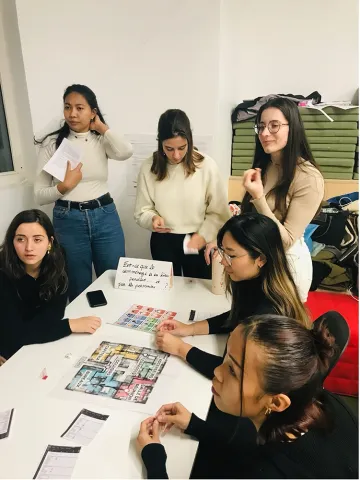
Ethnographic Exhibition
This exhibition concludes the ethnographic learning journey organized by the Ethnography Institute in collaboration with the CFA.
Over the course of 12 months, students in the PGE apprenticeship program have participated in a new educational experience: a continuous course familiarizing them with ethnography in the workplace to develop their critical perspective on everyday work issues that we all face.
This course culminates in the presentation of these learnings, which employs a variety of innovative formats. Traditionally, writing has been the domain of the ethnographer, but students are encouraged to draw from a wide range of tools and experiment with formats that resonate with the issues raised. This sharing takes the form of a multimedia exhibition that articulates photographs, videos, comic strips, board games, podcasts, TikTok accounts, and more, all envisioned as tools for ethnographic expression.
The presentation of the works for the 2023 edition took place on December 14, 2023, in the form of a multimedia exhibition within the library space on the Paris campus, showcasing 15 works in a variety of formats. The next exhibition is scheduled to take place in December 2024 on the Lyon campus.
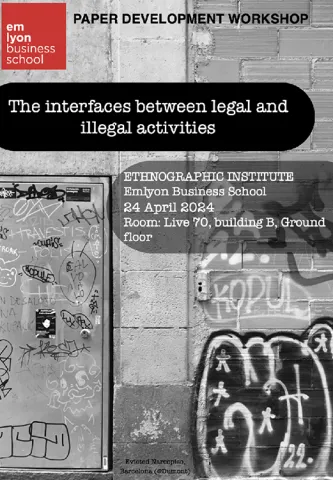
The interfaces of legal and illegal activities
April 24 2024 / Ethnographic Institute, emlyon business school
Organizing committee
Guillaume Dumont, emlyon business school, France.
Loïc Pignolo, University of St. Gallen, Switzerland
Theme
Legal and illegal economic activities are often considered separate social spheres and studied in isolation. However, recent studies have advocated for a more nuanced of how legality and illegality are interconected (Beckert & Dewey, 2017; Beckert & Wehinger, 2013; Mayntz, 2017). Ethnographic scholarship on law and illicit economies illustrates how the illegality of activities is constructed in relation to legal norms, and explores how illegal activities are intertwined with legal activities in their daily unfolding. Illegal economies, for instance, often build on available legal infrastructure (Columb, 2020; Feltran, 2022). Moreover, people engaged in illegal activities interact with “official guardians of legality” (Mayntz, 2017, p. 44), eventually leading to corruption (Dewey, 2020) and strategies of concealment (Steiner, 2017). Also, specific activities and practices across contexts can be viewed as meaningful and legitimate, despite their illegality (Contreras, 2012; Dewey, 2020; Rodgers, 2022). These works point to the importance of legitimacy and social legitimization when understanding the relationship between legality and illegality (Beckert and Dewey, 2017; Mayntz, 2017). The concept of “interface” captures the points of intersection, connection, and linkages between legality and illegality, and between illegality and legitimacy (Beckert and Dewey, 2017; Mayntz, 2017).
In this context, we believe that ethnographic investigations are crucial for developing an empirical understanding of the strategies allowing people to navigate these interfaces and the resulting ambivalences, contradictions, and dilemas. After the success of the 2023 edition, this year workshop takes the intimate interconnectedness between legal and illegal activities as a starting point to uncover empirically and explain theoretically how people create, negotiate, and implement specific practices and activities at their interface. Investigating this question is theoretically significant because it poses substantial challenges to people and calls to extend the previous efforts centered on market exchanges to encompass other non-economic, but no less critical, spheres of everyday life.
We invite papers investigating the interfaces of legal and illegal practices ethnographically. Ethnography has long proven vital in accessing hard-to-reach populations (Boeri & Shukla, 2019; Nordstrom & Robben, 1996; Pignolo & Cattacin, 2023). The immersion of the ethnographer is crucial to building trust and collecting indepth data (Adler & Adler, 1987; Dumont, 2023), and capturing the doubts, dilemmas, joys, and anxieties inextricable from the experience of everyday life. Accordingly, we welcome ethnographic contributions exploring, but not limited to, the following questions:
• How do individuals respond to the development and enforcement of laws and regulations by inventing and implementing illegal practices enabling their economic activity?
• How is policymaking dialogically influenced by people’s creative efforts to continue and develop illegal activities?
• How might the ambiguity, ambivalence, contradiction, and negotiation involved in navigating the interface of the legal and illegal influence the process of identity construction, social legitimization, and aspiration building?
• What kind of resources for illegal actions can be found in legal settings, and how are these resources exploited?
• What is the role of local communities and inhabitants in shaping these interfaces, and, conversely, what consequences do these interfaces have on local communities and inhabitants?
Purpose and format
This PDW aims to provide ethnographers from different disciplines (e.g., sociology, anthropology, criminology, management) and at different stages of their fieldwork and career with guidance and expertise in developing their papers. Invited discussants will help participants to: (1) think about novel ways to use their ethnographic data to construct a compelling narrative for their paper, and (2) develop a theoretical contribution building on this data. This PDW is structured as a one-day workshop with an interactive format where each author will be provided 10 minutes to present the paper and 35 minutes for collective discussion. Two discussants will review each paper to provide developmental feedback to strengthen and improve the authors’ work. All authors must also commit to reading two selected papers before the workshop to provide additional feedback.
Application
We invite authors to submit a 500-word abstract of their paper by December 15, 2023 to gdumont@em-lyon.com and loic.pignolo@unisg.ch. Notification of acceptance will be provided by January 5, 2024 and full papers must be submitted by April 1, 2024. The workshop will take place at emlyon business school, France, on April 24, 2024. More details on travel options and accommodation will be provided upon notification. Lunch and dinner on the day of the workshop will be provided for participants.
References
Adler, P., & Adler, P. (1987). Membership Roles in Field Research. Sage. Beckert, J., & Dewey, M. (2017). The Architecture of Illegal Markets: Towards an Economic Sociology of Illegality in the Economy. Oxford University Press. Beckert, J., & Wehinger, F. (2013). In the shadow: Illegal markets and economic sociology. Socio-Economic Review, 11(1), 5–30. Boeri, M., & Shukla, R. K. (Eds.). (2019). Going into the Gray: Conducting Fieldwork on Corporate Misconduct. In E. Soltes, Inside Ethnography: Researchers Reflect on the Challenges of Reaching Hidden Populations. University of California Press. Columb, S. (2020). Trading Life: Organ Trafficking, Illicit Networks, and Exploitation. Stanford University Press. Contreras, R. (2012). The Stickup Kids: Race, Drugs, Violence, and the American Dream. Dewey, M. (2020). Making It at Any Cost: Aspirations and Politics in a Counterfeit Clothing Marketplace. University of Texas Press. Dumont, G. (2023). Immersion in Organizational Ethnography: Four Methodological Requirements to Immerse Oneself in the Field. Organizational Research Methods, 26(3), 441–458. Feltran, G. (Ed.). (2022). Stolen Cars: A Journey Through São Paulo’s Urban Conflict (1st edition). Wiley. Mayntz, R. (2017). Illegal Markets: Boundaries and Interfaces between Legality and Illegality. In J. Beckert & M. Dewey (Eds.), The Architecture of Illegal Markets: Towards an Economic Sociology of Illegality in the Economy (pp. 37–46). Oxford University Press. Nordstrom, C., & Robben, A.. (Eds.). (1996). Fieldwork Under Fire: Contemporary Studies of Violence and Culture. Pignolo, L., & Cattacin, S. (2023). Enquêter l’illégalité: Les défis méthodologiques de se confronter à un terrain ambivalent. Sociologie, 14(3), 351–368. Rodgers, D. (2022). (Il)legal Aspirations: Of Legitimate Crime and Illegitimate Entrepreneurship in Nicaragua. Latin American Politics and Society, 64(4), 48– 69. Steiner, P. (2017). Secrecy and Frontiers in Illegal Organ Transplantation. In J. Beckert & M. Dewey (Eds.), The Architecture of Illegal Markets: Towards an Economic Sociology of Illegality in the Economy (pp. 51–69). Oxford University Press.
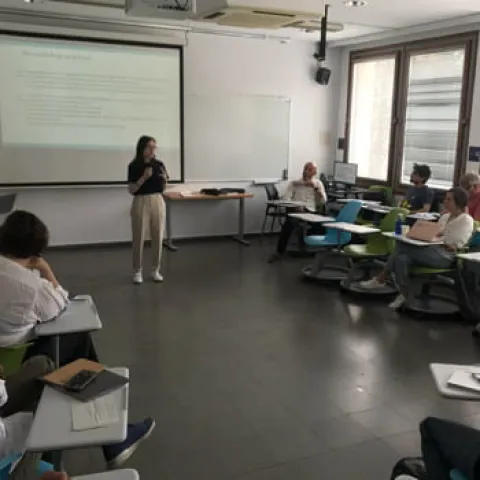
Ethnoworkshop
The “Ethnoworkshop” is a space where ethnographers can share the challenges they face when getting closer to people’s everyday lives and when they work to turn their experience into writing. This two-day event welcomes Ph.D. students as well as junior seasoned scholars working in a wide range of social sciences disciplines and topics with an international colleague and friendly spirit.
Our overall goal with this workshop is to discover and discuss empirical elements from ongoing or past fieldwork, and how they might resonate with further theoretical considerations. In other terms, the workshop is designed for discussing mostly fieldwork contributions and questions rather than classic is-that-the-right-theory- presentations,
The Ethnography Workshop has been organized for 10 years by emlyon business school, Cardiff University, VU Amsterdam, ESADE Business School, Dauphine University, Louvain University and ESADE Business School.
CALL FOR PAPER | 11h edition of the Ethnography Workshop | ESADE Business School | May 6-7 | Barcelona
We are pleased to announce that the 11h edition of the Ethnography Workshop will be hosted by ESADE Business School, on May 6 and 7, 2024, in Barcelona, Spain.
This workshop, created in 2013, is designed as a convivial space where you can share the peripeties of your ethnographic journey and think both through and beyond your observation with an interdisciplinary group of scholars (e.g., Management, Sociology, Anthropology, Entrepreneurship).
The workshop aims to foster a space for experimentation, play, and critique to engage ethnographically on a wide variety of topics. Discussing empirics, reflexive matters, issues of engagement and relationships with the field, are central to our conversations.
Participation is free of charge, and refreshments and meals are provided but participants are expected to cover their travel and accommodation expenses. Three emlyon Ethnography Institute grants of 500 euros are available to support participants with limited funding.
- Abstract (500 words) are due by March 1st, 2024, to blum@em-lyon.com.
- Notification of acceptance on March 18th and full paper due by April 28th.
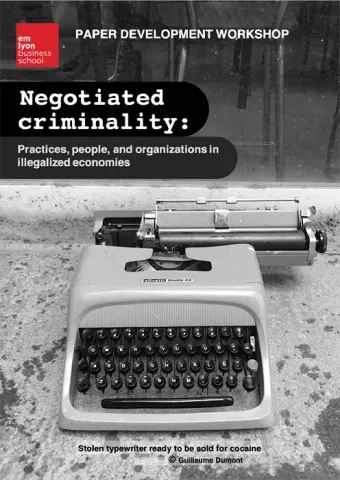
Negotiated criminality: practices, peoples, and organizations in illegalized economies
April 25 2023
Organizing committee:
Guillaume Dumont, emlyon business school, France.
Louis Vuilleumier, University of Fribourg, Switzerland.
Loïc Pignolo, University of Geneva, Switzerland.
Theme
Illegalized economies are a global phenomenon. While they enable some individuals in extremely precarious conditions to make a living or acquire illegalized goods and services, they also represent huge profit opportunities for both criminal and non-criminal organizations. Additionally, illegalized economies raise moral controversies and lead to considerable policing efforts at the local and international levels. Furthermore, the activities at the core of these economies take place within rural and urban communities, where attitudes towards illegality can range from tolerance and support to indignation and contestation. In other words, illegalized economies are embedded in complex and multi-layered contexts shaping how individuals and organizations navigate everyday life.
Ethnographers have long been on the front line in the study of the practices, people, and organizations constitutive of these illegalized economies (Becker, 1973; Ferrell & Hamm, 1998; Koonings et al., 2019; Parnell & Kane, 2003). Their commitment to prolonged presence has proven key for accessing hidden populations and practices, and their involvement in multiple aspects of the everyday life of these populations is crucial to building trust and collecting in-depth data (e.g., Adler, 1993; Bourgois, 2003). These aspects make ethnography uniquely suited to seeing beyond the oversimplified and distant views on illegalized economies. Additionally, the unique nature of the activities under study (often framed as violent, illegal, criminal, immoral) shapes how ethnographers write about their field (e.g. Boeri & Shukla, 2019; Jones & Rodgers, 2019).
Purpose and format
The purpose of this PDW is to provide ethnographers at different stages of their fieldwork with guidance and expertise in the development of their manuscripts before submission. Senior scholars will help participants to (1) think about novel ways to use their ethnographic data in the construction of a compelling narrative for their paper and (2) develop a theoretical contribution building on this data. This PDW is structured as a one-day workshop with a highly interactive format, in which each author will be provided 10 minutes to present the paper and 35 minutes for collective discussion. Each paper will be reviewed in-depth by one senior scholar, who will provide practical and developmental written feedback aimed at strengthening and improving each author’s work. All authors must commit to reading two selected papers of other participants and providing additional feedback.
Final program
Introduction Guillaume Dumont/Loïc Pignolo/Louis Vuilleumier.
Building a positive sense of self in a morally ambivalent market.
The case of the street-level cannabis market in Geneva
Speaker: Loïc Pignolo (Geneva Uni.)
Discutants: David Courpasson (Emlyon) and Mar Perezts (Emlyon)
Being a socially included woman who use and sell drugs. A comparison between Bordeaux and Montréal. Speaker: Sarah Perrin (ISPED)
Discutants: Dennis Giordano (Emlyon) and Mar Perezts (Emlyon)
Researching illegalized economies. Potentials, limits and challenges of ethnographic work in the Port of Santos, Brazil. Speaker: Isabela Vianna Pinho (UFSCAR)
Discutants: Dennis Rodgers (IHEID) and Guillaume Dumont (Emlyon)
Mother’s spatial dispossession and negotiations at the urban margins of Marseille: towards a spatial approach to intersectionality
Speaker: Alice Daquin (IHEID)
Discutants: David Courpasson (Emlyon) and Gabriel Feltran (Sciences Po)
Another life, maybe?
Speaker: Elena Butti (IHEID & UCL)
Discutants: Matias Dewey (St. Gallen Uni.) and Meropi Tzanetakis (Manchester Uni.)
Negotiated illegalization, performed deservingness. Migrants drug workers navigating police scrutiny.
Speaker: Louis Vuilleumier (Fribourg Uni.)
Discutants: Dennis Rodgers (IHEID) and Gabriel Feltran (Sciences Po)
Negotiating drug exchanges on cryptomarkets
Speaker: Meropi Tzanetakis (Manchester Uni.)
Discutants: Dennis Giordano (Emlyon) and Matias Dewey (St. Gallen Uni.)
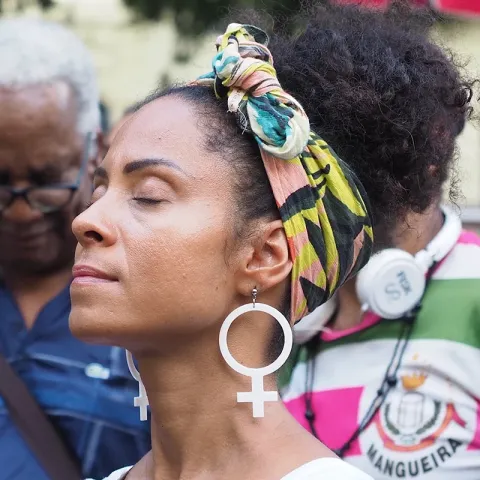
Marielle’s Legacy Will not Die
On April 19, 2023, the Institute for Ethnography research, in partnership with the student associations Em’brace and Olympe, organized a conference-screening-debate around the work of Leonard Cortana, a doctoral student in Film Studies at the University of New York and a research affiliate at the Internet and Society Center of Harvard University.
His short film (22 minutes), Marielle’s Legacy Will Not Die, produced as part of his doctoral research, retraces the struggle of Brazilian women activists who fight for justice for Marielle Franco, a black and lesbian city councilor in Rio de Janeiro. Coming from the favelas, she was brutally murdered in March 2018, in the city center, by two retired military police officers.
Before the screening, Leonard Cortana gave an introductory lecture to contextualize the film and connect it to his research. Following the screening, he engaged in a debate and exchanged ideas with the audience, addressing the issues of visual ethnography.
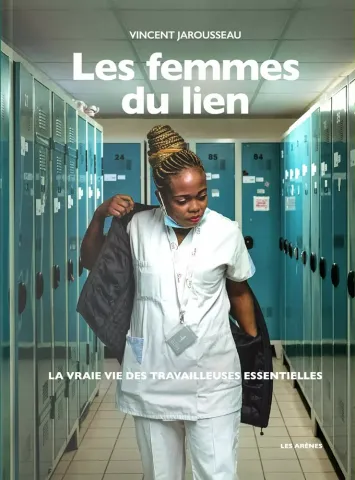
Les femmes du lien
The Institute of Ethnography of emlyon presents a meeting/debate with Vincent Jarousseau, photojournalist, documentarian, and independent filmmaker.
The release of his latest work "Les femmes du lien" (published by Les Arènes, 2023) is an opportunity to reflect on Vincent Jarousseau's journey as an author of documentary investigations in various settings across France.
The meeting aims to highlight the experience of his investigative work that intertwines photography, life stories, and comics.
We look forward to welcoming you as part of the course "Ethnographic Approaches" with the 2023 promotion of CFA apprentices, on Tuesday, May 2, at 1:30 PM in Amphi JVD (Julie-Victoire Daubié) on the Écully campus.
Excerpt from the presentation of the book "Les femmes du lien" on the publisher’s website: "Discover a choral narrative featuring eight women that combines photo-novel, documentary, and comic book. Valérie is a social and family intervention technician; Marie-Basile is a home helper; Angélique is a childminder; Marie-Claude is a nursing aide; Rachel is an educational and social companion; Julie is a specialized educator; Séverine is a social life auxiliary; Marie-Ève is a family assistant. Eight women among the three million 'essential' workers that the health crisis has highlighted. For two years, Vincent Jarousseau walked alongside them. He presents their words here. To account for their working and living conditions, to convey the complexity and diversity of experiences, and to adopt the perspective of those who create connections in our societies."
Vincent Jarousseau: Born in Nantes in 1973, Vincent Jarousseau graduated in Art History and History from Paris I Panthéon-Sorbonne. He is a photographer-documents professional and has been a member of the Hans Lucas agency since August 2015 and part of the independent journalist collective Les Incorrigibles. His photos are regularly published in national and international media (Libération, Le Monde, La Croix, Le Pèlerin, l’Obs, La Vie, Les Échos, Society, Marianne, Phosphore, Le Monde des ados, Revue XXI, Harper’s, Dissent Magazine, Das Magazin, Süddeutsche Zeitung, FOCUS…).
From 2014 to 2016, he undertook the production of a long-term photographic documentary with historian Valérie Igounet on the cities managed by the National Front. The result was a book published by Les Arènes in February 2017, titled "L’illusion Nationale." This unique work (a documentary recycling the codes of the photo-novel) was widely praised by critics. Between 2016 and 2018, he extended his work on the French fractures by documenting the daily lives of several families from working-class backgrounds through the lens of mobility in Denain in the North. He conducted this project with the support of the Forum Vies Mobiles. This work led to the publication of a new photo-novel-documentary, "Les racines de la colère," published by Les Arènes (March 2019). This latter book has resulted in numerous conferences and exhibitions in France, Germany, and Spain. The book was released in its German version by Blessing Editions in March 2020 (excerpts from: www.vincentjarousseau.com/a-propos).
